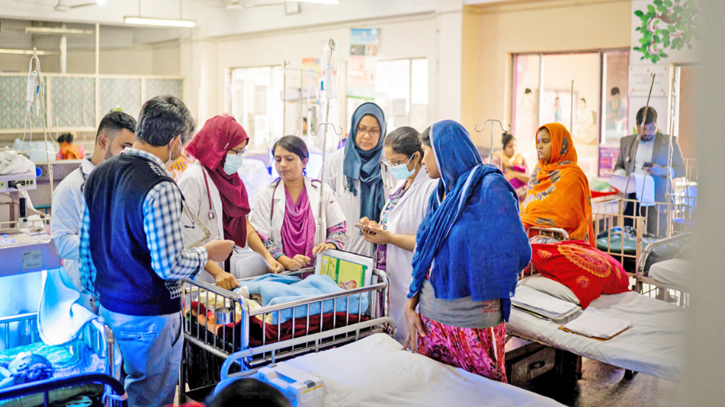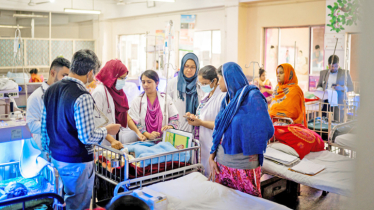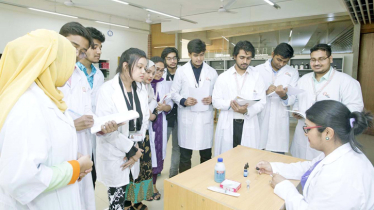
Photo : Collected
The moment we enter any public hospital, we see an overloading crowd of people, more attendees than patients. Attendees, who want to take care of their loved ones but are mostly unaware of what exactly they need to do.
As a result, nurses, who are already dealing with a significant number of patients against limited beds in their hospital, are required to manage the attendees as well.
Bangladesh’s healthcare system is grappling with a significant challenge: a dire shortage of nurses. According to the World Health Organization (WHO), there should be three nurses for every doctor, yet the current reality starkly deviates from this standard. Bangladesh, with its 102,997 registered doctors, should ideally have over 300,000 nurses. However, as of April 2020, there were only 73,043 registered nurses in the country. This imbalance not only places immense pressure on our healthcare providers but also compromises the quality of care patients receive.
On the other hand, when we look at our health system, we can see that family members, who are staying in the hospitals with the patients, are largely missed out as an element in the health system. By empowering these family members along with the patients with the knowledge and skills needed for caregiving and practicing healthy behaviors, we can significantly reduce the burden on nurses and improve health outcomes.
The Vital Role of Family Members in Patient Care
Family members have always been at the central of patient care in Bangladesh. It is a cultural norm for families to take primary responsibility for their loved ones when they fall ill. By including them in the formal care process, we can leverage this tradition to enhance patient outcomes. Educating families about healthy behaviors and basic caregiving skills can lead to early intervention, preventing diseases from escalating to critical stages. Informed family members can ensure that patients adhere to treatment plans, attend follow-up appointments, and adopt healthy lifestyles.
Studies have shown that involving families in patient care can reduce readmissions, complications, and mortality rates. Moreover, it fosters a supportive environment that promotes recovery and well-being.
When families are equipped with the necessary knowledge, they can manage minor and manageable health problems at home, reducing the number of patients who need to visit hospitals. This alleviates the strain on healthcare facilities and allows nurses and doctors to focus on more critical cases.
Implementing Family Caregiver Training: A Path Forward
The successful inclusion of family members in patient care requires systematic changes. First and foremost, the government must endorse and support this initiative. Training programs for nurses and midwives should include modules on how to educate and engage family members as caregivers. Hospitals should conduct regular health education sessions for families, covering topics such as disease prevention, identification of danger signs, medication adherence, and basic first aid.
To ensure the effectiveness of these sessions, a robust supervisory mechanism is essential. Supervisors should monitor and evaluate the sessions. Additionally, discharged patients and their families should receive ongoing education through mobile phones and social media, reinforcing the lessons learned in the hospital.
Care Companion Program (CCP), under the direction of Directorate General of Health Services (DGHS) offers a promising model for such initiatives. Launched in mid-2022 in Bangladesh by Noora Health Bangladesh, endorsed by DGHS, CCP is now operational in 390 hospitals across Bangladesh. This program trains family members in newborn and maternal health, equipping them with the skills to provide effective care at home through in-person health education sessions at the hospitals and phone-based health education following discharge. By 2027, Noora Health aims to expand CCP to include general medicine, surgery, and non-communicable diseases, reaching nine million people in the country. As part of this Care Companion Program, more than 730 nurses are conducting condition-specific health education sessions at their hospitals to the patients and their attendees (family members).
Nipa Palma, a Senior Staff Nurse of Brahmanbaria 250-bed General Hospital, is currently running the session in SCANU ward.
“Our relationship with the families has improved because of these sessions. The communication between us is now more respectful. When I am teaching them in the session, I don’t usually need to repeat the instructions one by one later again. So, it also reduces some workload.”, said Nipa Palma.
Patients and family members are also appreciating the efforts that the nurses are putting through these sessions.
“Little did I know how to maintain the hygiene of a newborn, but in this session, the nurse showed it step by step. This will help me to take better care of my child. People share different information. But now I know which ones are correct and which ones are not. I will be mindful of this from now on.”, said Monika, a new mother who received the session during her hospital stay.
Addressing Challenges and Ensuring Sustainability
Despite its potential, involving family caregivers in patient care presents several challenges. Training nurses and midwives to conduct health education sessions, ensuring consistent delivery of these sessions, and maintaining accurate records require substantial effort and resources. Moreover, the widespread shortage of healthcare workers and low literacy rates among patients and their families further complicate the implementation.
To address these challenges, it is crucial to integrate family caregiver training into the national health sector program and allocate a sufficient budget for its execution. The supervision and monitoring of the program should be incorporated into the regular health service delivery framework. Additionally, providing incentives for nurses and midwives who excel in their roles can motivate them to engage actively in the program.
In conclusion, promoting health education and involving family caregivers in patient care is not merely an option but a necessity for Bangladesh. This approach holds the promise of alleviating the burden on our overworked nurses, improving patient outcomes, and fostering a healthier society. With concerted efforts and strategic planning, we can harness the power of informed families to transform our healthcare system to the next level of excellence.
Note:
Noora Health is a US registered, not-for-profit organisation, working to improve patients’ outcomes at the hospitals and has been implementing family caregiver training programs known as Care Companion Programs (CCP) since 2014. Noora Health trains the nurses, selected by the respective facilities, and these trained nurses provide health education sessions at their wards to instill transformative behavior change among the families of patients with education and high-impact health skills making them an integral part of healthcare delivery. The Care Companion Program provides health behavior change-focused training, and mobile phone-based services to support family caregivers of patients at public hospitals and clinics in diverse health areas such as maternal & newborn care, cardiac care, TB, general medical care, general surgical care, non-communicable diseases, and adolescent health.
Messenger/Fameema








